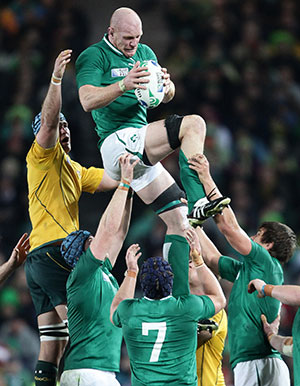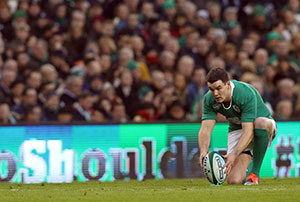A more positive frame of mind for Irish rugby

Roula Khalaf, Editor of the FT, selects her favourite stories in this weekly newsletter.
A team going into a World Cup having won two consecutive Six Nations titles would reasonably expect to appear on the list of pre-tournament favourites.
Yet this is Ireland, a team that despite regularly beating the world’s best in the Six Nations and competitive test matches has never made it past the World Cup quarter-finals. It is a track record that even former captain Keith Wood admits is “at times embarrassing”.
“We are one of the top teams in the world at present, with back-to-back Six Nations,” says Wood, who played in three World Cups and skippered the Irish in 2003.
“To have not got to a semi-final is very poor. We’ll be looking to rectify that this time round.”
Ireland can hardly blame a lack of talent for their failures. The likes of Brian O’Driscoll and Paul O’Connell would be fit to grace any World Cup final.
Of course, Ireland have a smaller pool of players to call upon than other countries, and injuries to key players are keenly felt. But the suggestions from some quarters are that Ireland’s problems might be mental rather than physical.
Shane Horgan, the former winger with 65 caps who was part of the Irish side that did not make it past the group stages in 2007, has spoken of how the players must be prepared for the “step up in psychological pressure” that comes with the World Cup.
Michael Kearney, Ireland team manager, shrugs off this notion. “I think all that stuff is overplayed,” he says. “We certainly won’t be going into the World Cup with any psychological barrier about going further in the tournament than we’ve gone before.”
Yet he concedes that explaining why Ireland have consistently underperformed in the tournament is difficult.
The FT’s guide to the 2015 Rugby World Cup

The big men are back. The world’s best 620 players (minus the infirm and overlooked) have assembled across England and Wales to contest the eighth world championship. View our interactive guide.
Read more
“You can never really put your finger on it,” says Wood. The former Munster and Harlequins hooker remembers going into the World Cup in 2003 thinking the team had an outside chance of winning the tournament. But, having navigated the group stage, Ireland were lined up for a last-eight clash with France in Melbourne.
“We’d beaten them twice in the previous three years,” he recalls. “But France turned up that day and — as only France can — every single thing they did was perfect. They blitzed us.”
Worse was to happen four years later when France hosted most of the tournament. Defeats by Argentina and Australia saw the Irish rapidly dispatched home.
During the most recent World Cup, hosted by New Zealand, a heavily praised Ireland side put on one of their best performances in defeating Australia to top their group before a gut-wrenching quarter-final defeat to Wales.

Wood believes Ireland took the wrong lesson from beating Australia, and saw the triumph as an end in itself. “But it wasn’t. It had to be [seen as] a step on the way to victory.”
Ireland will kick off their 2015 World Cup campaign when they face Canada in Cardiff on September 19, before taking on Romania and Italy.
All being well, the clash with France on October 11 will decide which of the two teams tops the group — vital given that the likely opponent for the second-placed side will be tournament favourites New Zealand.
“France is a massive game,” says Kearney. “If we win we don’t play for seven days. If we lose and come second in the group we play New Zealand six days later. So there’s a huge incentive.” Wood is clear: “Ireland need to beat France in the pool stages.”
Irish rugby fans have reason to be confident. As well as those two consecutive Six Nations championships, last autumn they beat South Africa and Australia.
In case they needed added motivation, Ireland will be desperate to ensure captain O’Connell goes out on a high. The talismanic lock is to retire from international rugby after the tournament. At 35, he is playing some of the best rugby of his career and was man of the series in this year’s Six Nations.
“It is actually quite scary to see him playing so well at his age,” says Wood. “My belief is that he will deliver.”
Then there is Joe Schmidt, the meticulous Kiwi who took over as Ireland’s head coach in 2013 after helping Leinster to win back-to-back Heineken Cups.
“Joe’s knowledge of the game and attention to detail are second to none,” says Kearney. “The players have utter belief in him. They genuinely believe that if they can execute the game plan the way Joe wants they will win the game.
“He tries to de-risk situations — that fits well into the Irish psyche. He gives a sense of comfort to the team . . . do what you are supposed to do, do it well . . . and we can win the game.”

Kristian Ross, who runs a social media account for followers of Irish rugby, says he has never been more excited as a fan of the national team. He points to fly-half Johnny Sexton and flanker Sean O’Brien as potential match winners. Scrum-half Conor Murray is another. “Joe Schmidt has really unlocked Ireland’s potential,” Ross says.
How far can Ireland progress? Wood insists they must look to go all the way. “You have to believe you can win the World Cup. You still have to take it one game at a time, but you have to believe you can hold aloft the trophy.”
He recounts a conversation with O’Driscoll: “[Brian’s view is] to make certain you get out of the group and past the quarter-final. Then you get to the semi-final and all bets are off.”
Kearney says reaching the semis is the minimum expectation for Schmidt’s team. “Get to the semi-final, then see what happens.”
Is winning the World Cup an unrealistic expectation? “Absolutely not.”
Comments